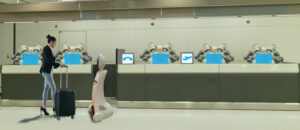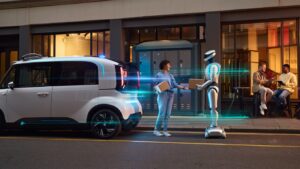AI in the hospitality industry is streamlining operations and improving guest interactions. It automates tasks like room assignments, predicts maintenance needs, and personalizes services based on guest preferences. By using data to anticipate needs, AI in hospitality enables faster responses, better service quality, and a smoother, more efficient guest experience. Here is how AI plays a big role in reshaping hospitality from the inside out.
Enhanced Guest Personalization
One of the most noticeable changes AI has brought to hospitality is how it tailors guest experiences. Instead of the one-size-fits-all approach, AI helps businesses adjust services to each guest’s preferences. This makes each stay feel more personal, creating a better experience for guests.
Here are some ways AI in hotel management helps with personalization:
-
Customizing Room Amenities
AI can analyze past stays or requests to set up rooms in a way that fits the guest’s preferences. For example, if a guest always requests extra pillows or a specific room temperature, AI remembers these details and applies them automatically.
-
Dining Recommendations
Based on a guest’s past dining choices, AI can suggest restaurants, meals, or even specific table settings. It is like having a personal dining assistant who knows exactly what you like.
-
Virtual Concierge Services
AI-powered systems can provide recommendations for entertainment, activities, and dining options. This is more than just a basic search tool – it pulls from data about the guest’s past interests, location, and even the time of day to suggest the best options.
Automated Housekeeping and Maintenance
AI in hospitality extends to housekeeping and maintenance tasks. It is no longer about sending a cleaning team floor by floor or waiting for something to break down before fixing it. AI uses data to make these processes smarter and faster, improving the guest experience and operational efficiency.
How AI Streamlines Housekeeping
AI changes the way housekeeping works by providing real-time data on room occupancy and guest preferences. Here’s how it helps:
-
Room Occupancy Tracking
AI knows exactly when a room is vacant and when it is occupied. This allows housekeeping staff to clean rooms immediately after guests check out, without waiting around or disturbing guests who are still in their rooms. It eliminates the guesswork.
-
Customized Cleaning Schedules
AI in hospitality can arrange housekeeping based on individual guest preferences. Some guests might want their rooms cleaned in the morning, while others may prefer the afternoon. AI takes these preferences into account and creates a cleaning schedule that fits both the guest’s needs and the hotel’s operational workflow.
-
Prioritizing Urgent Tasks
If a room needs immediate attention, such as when a guest spills something or requests extra services, AI can flag that room for immediate cleaning. This makes sure that urgent tasks don’t get lost in the shuffle of daily housekeeping routines.
Predictive Maintenance: Fixing Problems Before They Start
Maintenance is another area where AI shines. Instead of waiting for something to go wrong, AI can predict issues and address them before they turn into bigger problems.
-
Preventing Equipment Failure
AI systems constantly monitor the hotel’s equipment, from air conditioning units to elevators. If something is showing signs of wear or malfunction – such as unusual temperature readings, strange sounds, or slower performance – AI-powered customer service in hotel management can alert the maintenance team to fix the issue before it becomes a serious problem. This keeps everything running smoothly, reducing downtime and ensuring guests aren’t inconvenienced by unexpected breakdowns.
-
Efficient Repairs
AI doesn’t just alert the team when something is about to go wrong; it also helps prioritize which repairs need to happen first. Urgent tasks, such as a malfunctioning elevator, get pushed to the top of the list, while less immediate issues can be handled later. This way, the maintenance team can focus on what’s most important without wasting time.
-
Energy Savings
Systems used in AI in hospitality can also monitor energy use and suggest adjustments. For instance, if a room has been empty for a while, AI can automatically reduce heating or cooling to save energy. This keeps operational costs low and aligns with sustainability goals while guaranteeing that guest comfort is not compromised.
AI in Food and Beverage Management
AI in hospitality is significantly changing how hotels and restaurants manage their food services. Through smarter stock management and personalized dining experiences, it’s enhancing operations and improving the guest experience.
Smarter Stock Management
AI analyzes data from previous bookings and events to help hotels predict how much food and drink they’ll need on a daily basis. This means they can avoid ordering too much or too little. When stock levels are well-managed, it results in fresher ingredients being used, which ultimately improves the quality of the meals being served. Better inventory control also means less waste, which helps reduce costs and supports sustainability.
Reducing Waste and Saving Costs
One of the key benefits of AI in food management is its ability to prevent waste. By forecasting demand accurately, kitchens only prepare the necessary amount of food, which significantly cuts down on waste. This saves money and makes certain that fresh, high-quality ingredients are always used, which contributes to a better dining experience for the guests.
Personalized Dining Experiences: AI in the Hospitality Industry
Beyond the operational side, AI in hotel management is helping to create more personalized dining experiences for guests. It remembers things like dietary preferences, allergies, or favorite meals. So when a guest returns to the hotel, AI can suggest meals that fit their preferences without the guest having to repeat their requests.
Energy Management and Sustainability
By using real-time data and intelligent systems, AI in hospitality adjusts energy use in areas like heating, cooling, and lighting based on occupancy and environmental conditions, ensuring resources are used efficiently.
Reducing Energy Consumption with Real-Time Adjustments
AI in hotel management systems continuously monitors real-time data from the hotel’s environment. This includes factors like room occupancy, outside weather, and even time of day. With this data, AI can automatically adjust the building’s heating, air conditioning, and lighting. For example, if a room is vacant, the system will reduce or switch off heating and cooling to save energy. Similarly, in common areas, AI can adjust lighting intensity based on natural light or reduce power in low-traffic zones.
This creates a more efficient system that ensures no energy is wasted, even during peak operational times. The reduction in energy consumption also leads to lower operational costs, which is a priority for many hospitality businesses.
Sustainability Efforts That Don’t Sacrifice Comfort
AI’s ability to manage energy aligns perfectly with sustainability initiatives that are becoming increasingly important in the hospitality industry. Hotels are focused on reducing their carbon footprint, and AI helps achieve this by minimizing unnecessary energy consumption.
At the same time, with AI, guest comfort is never compromised. For example, rooms can be set to the ideal temperature shortly before a guest arrives, instead of keeping heating or cooling systems running all day. Similarly, AI can manage lighting and climate control in common areas, adjusting them based on real-time occupancy to keep guests comfortable while reducing energy use.
Additionally, AI-powered customer service systems can contribute to other sustainability efforts, such as:
- Water conservation: AI regulates hot water heaters based on real-time demand, ensuring hot water is available when needed without wasting energy.
- Energy-efficient lighting: Automated adjustments dim or switch off lights in unoccupied areas, saving power without affecting guest convenience.
- Smart resource management: AI continuously monitors energy usage and adapts in real-time to prevent waste, whether it’s in heating, cooling, or lighting.
AI-driven energy management strikes a balance between efficiency, sustainability, and comfort. By monitoring and adjusting energy use in real-time, hotels can reduce operational costs and energy waste while continuing to provide a comfortable stay for their guests. The integration of AI in sustainability efforts benefits the environment and supports the long-term success of hospitality businesses.
AI for Customer Service and Virtual Assistance
AI in hospitality is making customer service faster and more efficient, particularly through chatbots and virtual assistants. These tools handle routine tasks like answering common questions, managing bookings, and addressing guest requests—anytime, day or night. With AI in place, guests receive quicker responses and continuous support without overloading the hotel staff.
Improving Customer Service with AI Chatbots
AI chatbots are designed to take care of many common customer service tasks. They can handle:
- Frequently asked questions: Chatbots can answer standard questions about check-in, checkout, Wi-Fi access, or hotel amenities.
- Booking management: Guests can make, modify, or cancel reservations without waiting for human assistance.
- Basic troubleshooting: If a guest has minor issues, such as connecting to the Wi-Fi or understanding hotel policies, chatbots can provide immediate help.
Since these chatbots operate 24/7, guests get real-time answers regardless of when they need assistance. The added benefit is that chatbots learn from each interaction, becoming more accurate and useful over time.
Virtual Assistants for Personalized Support
Virtual assistants powered by AI in hospitality go a step beyond chatbots, offering more personalized and dynamic support. They handle more complex tasks and adjust their responses based on guest preferences. Virtual assistants are capable of:
- Tailored recommendations: They can suggest dining options, local attractions, or room upgrades based on a guest’s previous stays or preferences.
- Reservation modifications: Guests can easily change room types, request early check-in, or ask for late check-out through the virtual assistant.
- Room service and amenity requests: Whether guests want extra towels or to order room service, virtual assistants handle these requests smoothly.
These virtual assistants offer a more interactive and personal experience, all while managing multiple requests at once. This ability to multitask improves efficiency and keeps guests happy.
Seamless Communication for Guests
Integrating AI-powered customer service platforms brings several advantages that improve overall guest communication. Here’s how:
- Instant responses: Whether guests are asking about hotel amenities or making requests, AI systems provide fast and consistent replies across multiple channels (apps, websites, or messaging platforms).
- 24/7 availability: No more waiting for staff availability—AI platforms ensure that guest queries are answered anytime, without delay.
- Reduced staff workload: With routine queries handled by AI, human staff can focus on more personalized or complex guest interactions, improving service quality.
This seamless communication, powered by AI, not only improves guest satisfaction but also helps hotels run more efficiently, even during busy periods.
Data-Driven Decision Making
AI’s ability to analyze large volumes of guest data is transforming how hotels make decisions in marketing, pricing, and customer loyalty strategies. By processing this data efficiently, AI allows hotels to make smarter, more informed decisions that directly impact their bottom line.
AI’s Role in Analyzing Guest Data
AI AI in hospitality systems can sift through massive amounts of data—much more than human teams could handle—providing valuable insights into guest behavior and preferences. With this information, hotels can improve their strategies in key areas, such as:
- Marketing campaigns: AI helps identify guest segments and preferences, allowing hotels to target specific groups with personalized promotions, offers, or ads.
- Pricing strategies: By analyzing booking patterns, seasonal trends, and competitor pricing, AI recommends optimal room rates that balance occupancy and profitability.
- Customer loyalty programs: AI tracks guest behavior, such as repeat bookings or specific amenity usage, and suggests ways to enhance loyalty programs by offering rewards tailored to individual preferences.
Predictive Analytics in Revenue Management: AI in the Hospitality Industry
One of the most powerful aspects of AI is its predictive analytics capability. By using historical data and real-time inputs, AI can forecast future trends and suggest adjustments in pricing and marketing.
AI-driven predictive analytics can:
- Optimize pricing: AI AI in hospitality tracks factors such as demand fluctuations, special events, and even weather forecasts to recommend dynamic pricing adjustments. This helps maximize revenue without alienating guests with inconsistent rates.
- Enhance marketing efforts: Predictive analytics can identify the best times to launch promotions or advertise specific packages, targeting potential guests when they’re most likely to book.
- Improve resource allocation: AI forecasts help hotels allocate resources, such as staffing and inventory, more effectively by anticipating demand peaks and troughs.
Making Smarter Decisions Across the Board
AI helps hotels to stay ahead of the competition by using data intelligently. Instead of relying on outdated practices or intuition, hotels can now base their decisions on solid, actionable data. This not only improves profitability but also creates more relevant and appealing guest experiences.
The Future of AI in the Hospitality Industry
AI in hospitality is set to grow, with new trends emerging that will further enhance guest experiences and operational efficiency. One major trend is the use of AI-generated content for marketing, allowing hotels to create personalized promotions and ads quickly and efficiently. Another exciting development is virtual reality (VR) tours, giving potential guests the chance to explore rooms and amenities before booking. Lastly, AI will continue driving further personalization, tailoring every aspect of a guest’s stay, from check-in preferences to in-room experiences, making each visit unique.
The Impact of AI in the Hospitality Industry: Driving Efficiency and Guest Satisfaction
AI in the hospitality industry is streamlining operations, improving guest experiences, and supporting sustainable practices. From personalized services and energy management to enhanced customer service and data-driven decisions, AI helps hotels run more efficiently while meeting the needs of today’s guests. As AI technology continues to evolve, the hospitality sector will benefit from even more personalized and innovative solutions, ensuring a smarter, more enjoyable stay for guests and a stronger, more competitive position for businesses.
Looking to implement AI in the hospitality industry? Contact RTS Labs for expert guidance on integrating cutting-edge technology into your operations, improving efficiency, and enhancing customer experiences.









